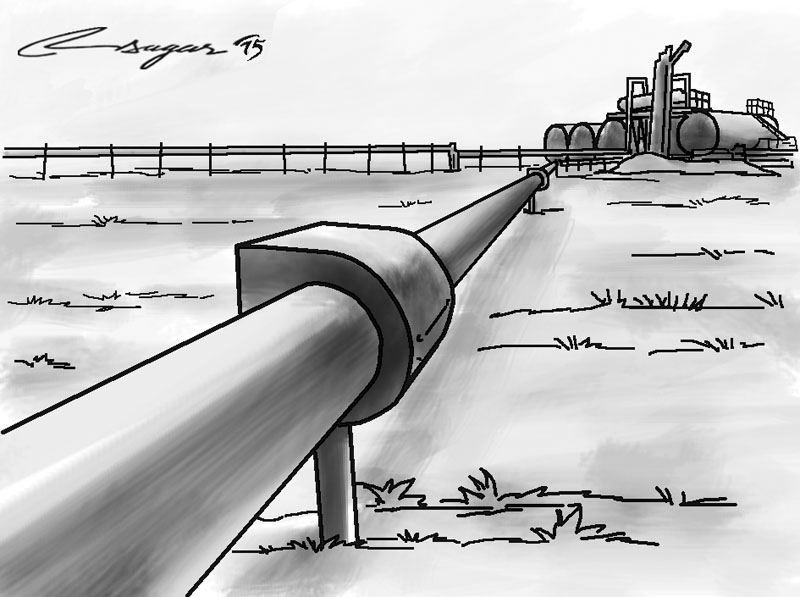Advocacy for self-reliance: Lessons must be learnt
Following the recent catastrophic earthquake of April 25, there should have been much greater efforts to develop a good road network, not only to our northern borders, but also in the East-West direction of the country. This will open up the inaccessible areas of our land and reduce the cost of consumable items produced in different parts of the country
This is the third time that we have crossed swords with India. The previous occasions were during the rule of two kings -- Mahendra and Birendra. This third occasion is turning out to be more drastic. The first encounter was associated with the classical remark of the late King Mahendra that ‘Communism does not travel by taxi ‘ along the newly constructed Kodari to Kathmandu road. The second was after the rumpus with PM Rajiv Gandhi when the late King Birendra is said to have remarked ‘we are in a mood to talk.’
The reality is that India is our big neighbour and whilst we Nepalis do play tantrums from time to time, the fact is that Western, African and American trading partners of India know very well which side of their bread is buttered, and so are keeping their mouths shut. The hardships that the poor countrymen of this landlocked mountainous country of Nepal has had to face for almost three months, as a result of the unofficial blockade of Nepal, is deplorable.
Another truth in India is that, irrespective of whether Rajiv Gandhi, Chandrashekhar or Narendra Modi is at the helm of affairs, it is the bureaucrats of South Block and RAW who call the shots. Political figures, irrespective of their image, are not the sole deciding factors. Perhaps Modi’s hands are tied too.
The writing on the wall and the hard fact is that water is going to be the amrit (nectar) of the twenty first century. Its shortage or its excess in future years can cause havoc in the areas of the countries through which the rivers in question flow. Though India is also going nuclear for the production of energy, it is the water that they are really after, both for drinking and irrigation purposes.
What this third blockade of Nepal by the Indians has demonstrated and highlighted to us Nepalis is that we as a nation have not learnt the lessons of the past. Even during the days of the Panchyati Raj, the country was self sufficient in ordinary daily necessities such as soap, matches, biscuits and chow-chow.
Our standards have now risen and we now hanker after more sophisticated products from India or much further afield. The hard currency which the authorities are spending without a care has been strenuously earned by the blood and sweat of our countrymen, many of whom have been working under harsh conditions in the Gulf countries. An average of five migrants are said to die daily and their bodies are brought back in coffins. It is time, therefore, that the remittances from the Gulf were utilised to set up industries or even simple undertakings to make the country self sufficient. There has to be rigorous implementation of ‘Buy Nepali’ whenever possible to support the home industry and build self reliance.
We must diversify our energy sources and use not only electric but also solar and wind power as the development of increasing hydropower energy will take time. Import duties for electric vehicles and solar panels must be drastically reduced and made negligible to encourage usage on a large scale.
Now that the Nepal Oil Corporation (NOC) has agreements with the state agencies of both India and China for the import of petroleum products it is time to allow private parties to ferry or bring such products from not only India but also from China to offer the public easy availability. It is heartening to note that NOC has started the process by awarding a fuel supply contract, albeit to a black listed firm to bring fuel from India. This needs to be investigated but the principle to use private parties should be enforced and similar action taken with regard to imports from China. The private parties are likely to strive much harder and bring quick results as it is a case of survival for them.
Whilst there has been much talk about building a pipeline from the oilfields of India to Raxaul the possibility of a similar pipeline from the North is much more feasible. No effort will be required to pump the oil as it will just flow down the slopes. The laying down of pipelines will be much quicker than building all weather roads. The layout of a very recent and feasible suggestion by Mahavir Pun on Facebook for this. It will start from Kerung at a height of 1,820 metres in Tibet via Sapru Besi (1,490m) and end at Betrawoti (706 m) in Nepal. The distance involved is only just forty-three kilometres.
Following the recent catastrophic earthquake of April 25, there should have been much greater efforts to develop a good road network, not only to our northern borders, but also in the East-West direction of the country. This will open up the inaccessible areas of our land and reduce the cost of consumable items produced in different parts of the country. It is disheartening to note that even after almost seven months not much has been done for those who suffered as a result of the earthquake.
The Reconstruction Bill to see to this is slated to be presented to the House. How long it will take to be passed is anyone’s guess. Prompt action by the new government for labour intensive activities will provide much needed job opportunities for our citizens who are in dire straits. At present they can only hope and wait.






